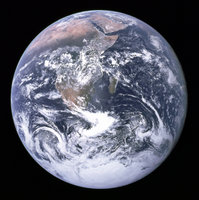COMMUNITY OF LIFE ON EARTH
 |
ECOLOGY
Ecology, or ecological science, is the scientific study of the distribution and abundance of living organisms and how these properties are affected by interactions between the organisms and their environment. The environment of an organism includes both the physical properties, which can be described as the sum of local abiotic factors like climate and geology, as well as the other organisms that share its habitat. The term oekologie was coined in 1866 by the German biologist Ernst Haeckel; the word is derived from the Greek oikos ("household") and logos ("study") therefore, "ecology" means the "study of the household of nature".
As a scientific discipline, ecology does not dictate what is "right" or "wrong". However, ecological knowledge such as the quantification of biodiversity and population dynamics have provided a scientific basis for expressing the goals of environmentalism and evaluating its goals and policies. Additionally, a holistic view of nature is stressed in both ecology and environmentalism.
UNITY OF LIFE ON EARTH.
Whether or not we have any transcendent considerations or ethical beliefs, I think that most rational and intelligent people would most likely agree that Life on Earth is most certainly a unified, ecological, community.
- The civilized person realize humanity's interdependence upon the ecological community of life on earth.
- The civilized person adapts their lifestyle to accommodate this realization.
- The civilized person adapts their lifestyle to serve the health and welfare of the unified, community of Life on Earth.
There is no need to have any particular spiritual beliefs to be a civilized, intelligent, wise, thoughtful, caring, and considerate human being.




